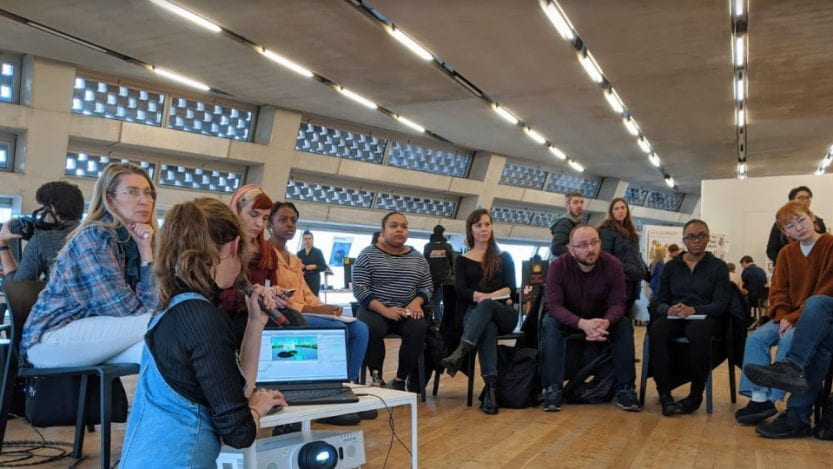In celebration of International Women’s Day on Sunday 8th of March 2020, Nicola Plant, Carlos Gonzales Dias and Clarice Hilton from Goldsmiths Computing, ran a special workshop on Using Machine Learning to Design Movement Interaction in VR for a half-day hackathon held at the Tate Exchange. Organised by the people at the XR Diversity Initiative to help make XR more accessible, the event aims to inspire under-represented groups to pursue a career in XR fields and celebrate the stories of women, the female form and movement. There were also workshops teaching 3D sketching in Google Tiltbrush, creating 360 film and non-linear storytelling in immersive technologies. The XRDI hackathon was a part of Digital Maker Collective running a full week of events exploring digital and emerging technologies in the context of arts practice, education, society and the creative industries.
Our participants were a diverse group ranging from theatre directors, visual artists, developers, dance practitioners, academics and more, all interested in learning about how to better bring immersive technologies to their fields.
During the workshop our participants gained a working understanding of how to use machine learning when designing movement interaction for immersive technologies, along with an introduction to VR in Unity. We started with an active, hands-on session exploring full body movement practices to facilitate designing compelling movement techniques. Then dived into learning interactive machine learning concepts and how to apply them to recognise and implement movement interaction designs in immersive environments using our InteractML tool (interactml.com).
To demonstrate the potential of what our participants could achieve with the tool, the team built a special set of VR artworks inspired by female artists that have exhibited their work at the Tate Modern, the setting for our workshop. These included virtual homages to Louise Bourgeois’ ‘Maman’, Kara Walkers ‘Fons Americanus’ and Yoyoi Kusamas ‘Infinity Mirror Room’, each showcasing how various machine learning algorithms can facilitate different movement interaction techniques to control visual elements within each work.
Although many of our participants did not have any previous experience in machine learning or immersive technologies, in a little over three and a half hours our participants were able to implement their movement interaction designs by configuring and training a machine learning model with the tool, allowing them to control light colours, show different animations or control the flow of fountain water just by moving in VR.

This workshop was part of the EPSRC funded research project, 4i: Immersive Interaction design of Indie developers using Interactive machine learning. This is a joint project with University of Coventry, University of the Arts, London, Gibson/Martelli and CodeLiberation.
